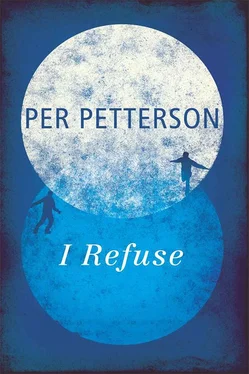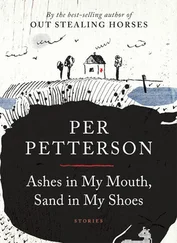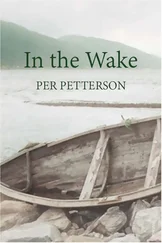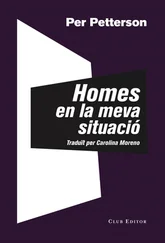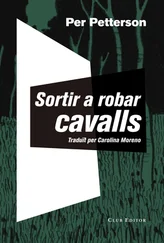‘Don’t stop,’ Tommy said, ‘we’ll get all stiff,’ and Jim bent down and thrust the spade into the gravel, and shovelling the gravel and stones, he said:
‘Yes, but it would be pretty good.’
‘We might wake someone up.’
‘We don’t need to sing that loud, just enough to help us with the digging. I mean, we’re down in a trench. No one will hear us anyway.’
‘OK. Why not. It has to be one that really fits, though,’ Tommy said, ‘or else it’ll just be a shambles, and we’ll lose the rhythm and get tired,’ and they thought hard as they hurled the gravel over the edge, and their hips swung back, and they thrust down the spades, and full of gravel and soil, they let it fly in even higher arcs, all the time wondering which song that might fit. They tried several Beatles songs and one by the Hollies, but they couldn’t get the rhythm right, and then they lost the beat, and Tommy said:
‘It won’t work. It’ll just be a shambles.’
‘Yes, maybe it will,’ Jim said, and then he said: ‘But listen to this one.’ And he began to sing:
Where’er you walk on hill and fell
A winter’s day, a summer’s night
and thrust the spade into the gravel, and swivelling round with the spade at knee height, he tossed the gravel out of the trench, up over the edge, and it worked and the rhythm was perfect if you didn’t sing too fast, and Tommy said:
‘No, no, we can’t sing a national anthem, it’s embarrassing, what if someone heard us.’
‘No one will hear us,’ Jim said. ‘We’ll be singing inside the trench,’ and they did. Down in the trench they sang ‘Norway in red, white and blue’ in very low voices, but still loud enough, and eventually it did help them with the rhythm, as soon as they had lost their embarrassment.
And then they were exhausted. They couldn’t lift another spadeful, they couldn’t lift a pickaxe. Their knees trembled so much it was hard to stand upright without leaning against something. They clambered out of the trench and sat on the edge with their legs dangling, inspecting the work they had done. Their breath came in quick, stuttering bursts, and all around them it was light, but no one was outside on the doorstep yet, no one had heard them singing. The light was on in Sletten’s kitchen. Jim picked up his pouch and rolled a cigarette. His hands shook, but for some reason this time he could do it, and he lit up and inhaled the smoke as deep as he could and then exhaled and smiled. They looked at each other, and Tommy said:
‘If I were a smoker, I would have smoked right now. You seem so damn pleased.’
Jim laughed.
‘So, how far did we get,’ he said.
‘Let’s see now.’ Tommy got up stiffly. ‘Oh, shit, am I stiff, or what,’ he said, almost struggling to the place where the telephone company men had stopped working the day before, where Jim and Tommy had taken over, and he paced the distance between that point and the point where the two of them had finished digging only minutes before.
‘About five metres,’ he said. ‘Not less than that,’ and it may not sound a lot, but it was, and Tommy was proud and said: ‘Not bad. We’re working heroes. We should be given medals.’ And Jim said:
‘In the Soviet Union the workers were given medals if they had worked really hard. In the 1930s at least, they got their medals. The best were given prizes. The Stakhanov Prize, it was called. It was a big deal.’
‘How do you know that.’
‘I know a lot of stuff.’
‘That’s true. You do. But we’re against the Soviet Union, aren’t we. After what happened two years ago.’
‘Definitely,’ Jim said.
‘Well, then we don’t give a shit about those medals,’ Tommy said. ‘We can do without them.’
Suddenly they heard the drone of a diesel engine down the road. Jim looked at his watch and got up and threw the cigarette butt into the trench and said:
‘Tommy, we’re off,’ and Tommy got to his feet and they were out of there before the the truck with the workers came round the bend. They walked in behind Sletten’s house and down along the row of houses at the back, where the living rooms were, and the woodsheds, and a greenhouse was there with every third pane of glass smashed in its frame, and no one was in their living room on this side of the house, at this time of day, now all those who were up were in the kitchen at the front. So the two of them walked with the houses and the kitchen gardens on their left and the dip on the right, and across the field they saw Birkelunden and the pond where Lobo had almost drowned. He was dead now. The vet came out from Mørk to give him an injection. Jesus, he said, we’ll have to let him go, this has gone too far, this, too long, I should have come out before, and he did have a point, for Lobo couldn’t walk any more, he could barely stand upright when he ate. So there was no way round it. But this was several years ago now.
‘Do you remember Lobo,’ Jim said.
‘Of course I do,’ Tommy said.
‘I remember you saved him from drowning in the Bjørkerud Pond. Everyone talked about it afterwards. Your mother was there, wasn’t she. People wondered why she didn’t save him. Why you had to.’
‘My mother couldn’t swim.’
‘But grown-ups can touch the bottom there.’
‘I know,’ Tommy said.
‘You were only ten years old. You couldn’t touch the bottom, you had to swim.’
‘I know,’ Tommy said.
‘I know you know. I’ll keep my mouth shut.’
‘No it’s fine,’ Tommy said.
Now they had almost reached the end of the row, and it wasn’t something they had planned to do, to go there, they had been at Willy’s party, that was all, and then all of a sudden they were standing by the house that once had been the Berggrens’ house, at the back, and the windows were still boarded up with the same boards the carpenter had used that day, the man who had a yellow hammer painted on his red van. As far as they knew, no one had even touched the door handle since. It wasn’t that far from Jonsen’s house, some hundred metres only, but Tommy hadn’t been there, hadn’t walked past the Berggren house for four years. He could see it through the window from his seat in the school bus, but he always looked away as they went past.
From the edge of the field they forced their way through the ragged bushes on to the flagstones behind the Berggrens’ house. The old chair Tommy’s father used to sit on and smoke was still in the same place, but you didn’t feel like sitting there now. They walked over to the windows. The boards had started to rot and crack and loosen around the nail heads. They were lousy boards. Tommy started to pull at one of them. No one could see them on this side, there was no one outside back here but the two of them and a quiet mist above the field and the dip and Birkelunden, and you couldn’t see the pond. They could easily hear the diesel engine at the other end of the neighbourhood, but it no longer had anything to do with them. It hardly occurred to them what the telephone company people might say when they arrived and saw what had happened while they were at home in their beds. But the trenches were already in the past, they didn’t think about them. And Tommy pulled hard at one board and the nails came loose and he was suddenly flying backwards with the board in his hands and almost fell over. He threw it away and walked back and pulled another one right off the window, and then another one, and it wasn’t difficult at all.
‘Goddamn, what shitty boards,’ he said. ‘That carpenter may have been a communist, but he was stingy, that’s for sure.’ The carpenter had been around in Mørk for two years, and then he was gone. Everybody said he was a communist, so they didn’t give him much to do, but he probably wasn’t. A communist. He just refused to paint his van a different colour.
Читать дальше
